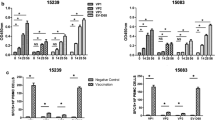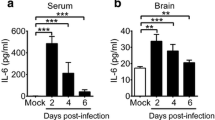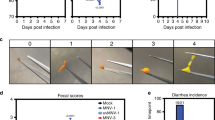Abstract
Antibody-dependent enhancement (ADE) of virus infections can be induced by subneutralizing concentrations of specific antibodies. We recently demonstrated ADE in human monocytes infected with enterovirus 71 (EV71). The current study was designed to extend these observations by determining the effect of ADE on the pathogenesis of EV71 infection in newborn mice. We compared the clinical manifestations, mortality, virus titer, histopathology, and serum levels of cytokines and chemokines in newborn mice pretreated with subneutralizing antibodies to EV71 or normal mouse IgG with and without virus. Seven-day-old ICR mice were pretreated with a wide range of mouse anti-EV71 IgG 24 h prior to intraperitoneal injection of EV71. Mice were protected from infection by neutralizing doses of anti-EV71 IgG ranging from 6.43 × 10−1 to 329.6 μg/ml. Subneutralizing doses ranging from 2.01 × 10−2 to 3.21 × 10−1 μg/ml were found to significantly increase 14-day mortality compared to virus alone. The ADE effect was not evident at lower doses. Histopathological examination of mice given a subneutralizing dose of 8.04 × 10−2 μg/ml revealed extensive neuronal and muscular damage compared to untreated infected controls. Higher serum levels of interferon (IFN)-γ and monocyte chemoattractant protein (MCP)-1 were noted in mice pretreated with subneutralizing doses than untreated infected controls. These findings support the concept that subneutralizing antibodies directed enhance EV71 induce ADE in newborn mice.




Similar content being viewed by others
References
Huang CC, Liu CC, Chang YC, Chen CY, Wang ST, Yeh TF (1999) Neurologic complications in children with enterovirus 71 infection. N Engl J Med 341:936–942
Wang SM, Lei HY, Huang KJ, Wu JM, Wang JR, Yu CK, Su IJ, Liu CC (2003) Pathogenesis of enterovirus 71 brainstem encephalitis in pediatric patients: roles of cytokines and cellular immune activation in patients with pulmonary edema. J Infect Dis 188:564–570
Wang SM, Lei HY, Su LY, Wu JM, Yu CK, Wang JR, Liu CC (2007) Cerebrospinal fluid cytokines in enterovirus 71 brain stem encephalitis and echovirus meningitis infections of varying severity. Clin Microbiol Infect 13:677–682
Wang SM, Lei HY, Yu CK, Wang JR, Su IJ, Liu CC (2008) Acute chemokine response in the blood and cerebrospinal fluid of children with enterovirus 71-associated brainstem encephalitis. J Infect Dis 198:1002–1006
Ho M, Chen ER, Hsu KH, Twu SJ, Chen KT, Tsai SF, Wang JR, Shih SR (1999) An epidemic of enterovirus 71 infection in Taiwan. Taiwan Enterovirus Epidemic Working Group. N Engl J Med 341:929–935
Wang SM, Liu CC, Tseng HW, Wang JR, Huang CC, Chen YJ, Yang YJ, Lin SJ, Yeh TF (1999) Clinical spectrum of enterovirus 71 infection in children in southern Taiwan, with an emphasis on neurological complications. Clin Infect Dis 29:184–190
Wang SM, Ho TS, Shen CF, Liu CC (2008) Enterovirus 71, one virus and many stories. Pediatr Neonatol 49:113–115
Wang SM, Liu CC (2009) Enterovirus 71: epidemiology, pathogenesis and management. Expert Rev Anti Infect Ther 7:735–742
Luo ST, Chiang PS, Chao AS, Liou GY, Lin R, Lin TY, Lee MS (2009) Enterovirus 71 maternal antibodies in infants, Taiwan. Emerg Infect Dis 15:581–584
Wang SM, Ho TS, Lin HC, Lei HY, Wang JR, Liu CC (2012) Reemerging of enterovirus 71 in Taiwan: the age impact on disease severity. Eur J Clin Microbiol Infect Dis 31:1219–1224
Hawkes AR (1964) Enhancement of the infectivity of arbovirus by specific antisera produced in domestics fowls. Aust J Exp Biol Med Sci 42:465–482
Kliks SC, Nimmanitya S, Nisalak A, Burke DS (1988) Evidence that maternal dengue antibodies are important in the development of dengue hemorrhagic fever in infants. Am J Trop Med Hyg 38:411–419
Gimenez HB, Keir HM, Cash P (1989) In vitro enhancement of respiratory syncytial virus infection of U937 cells by human sera. J Gen Virol 70(Pt 1):89–96
Krilov LR, Anderson LJ, Marcoux L, Bonagura VR, Wedgwood JF (1989) Antibody-mediated enhancement of respiratory syncytial virus infection in two monocyte/macrophage cell lines. J Infect Dis 160:777–782
Ochiai H, Kurokawa M, Hayashi K, Niwayama S (1988) Antibody-mediated growth of influenza A NWS virus in macrophage-like cell line P388D1. J Virol 62:20–26
Robinson WE Jr, Montefiori DC, Mitchell WM (1988) Antibody-dependent enhancement of human immunodeficiency virus type 1 infection. Lancet 1:790–794
Halstead SB (1981) The Alexander D. Langmuir Lecture. The pathogenesis of dengue. Molecular epidemiology in infectious disease. Am J Epidemiol 114:632–648
Pierson TC (2010) Modeling antibody-enhanced dengue virus infection and disease in mice: protection or pathogenesis? Cell Host Microbe 7:85–86
Yang KD, Yeh WT, Yang MY, Chen RF, Shaio MF (2001) Antibody-dependent enhancement of heterotypic dengue infections involved in suppression of IFNgamma production. J Med Virol 63:150–157
Hober D, Nguyen TL, Shen L, Ha DQ, Huong VT, Benyoucef S et al (1998) Tumor necrosis factor alpha levels in plasma and whole-blood culture in dengue-infected patients: relationship between virus detection and pre-existing specific antibodies. J Med Virol 54:210–218
Hober D, Chehadeh W, Bouzidi A, Wattre P (2001) Antibody-dependent enhancement of coxsackievirus B4 infectivity of human peripheral blood mononuclear cells results in increased interferon-alpha synthesis. J Infect Dis 184:1098–1108
Girn J, Kavoosi M, Chantler J (2002) Enhancement of coxsackievirus B3 infection by antibody to a different coxsackievirus strain. J Gen Virol 83:351–358
Chehadeh W, Bouzidi A, Alm G, Wattre P, Hober D (2001) Human antibodies isolated from plasma by affinity chromatography increase the coxsackievirus B4-induced synthesis of interferon-alpha by human peripheral blood mononuclear cells in vitro. J Gen Virol 82:1899–1907
Wang SM, Chen IC, Su LY, Huang KJ, Lei HY, Liu CC (2010) Enterovirus 71 infection of monocytes with antibody-dependent enhancement. Clin Vaccine Immunol 17:1517–1523
Wang YF, Chou CT, Lei HY, Liu CC, Wang SM, Yan JJ et al (2004) A mouse-adapted enterovirus 71 strain causes neurological disease in mice after oral infection. J Virol 78:7916–7924
Sauter P, Lobert PE, Lucas B, Varela-Calvino R, Alm G, Wattre P, Hober D (2007) Role of the capsid protein VP4 in the plasma-dependent enhancement of the Coxsackievirus B4E2-infection of human peripheral blood cells. Virus Res 125:183–190
Huang KJ, Yang YC, Lin YS, Huang JH, Liu HS, Yeh TM et al (2006) The dual-specific binding of dengue virus and target cells for the antibody-dependent enhancement of dengue virus infection. J Immunol 176:2825–2832
Dejnirattisai W, Jumnainsong A, Onsirisakul N, Fitton P, Vasanawathana S, Limpitikul W et al (2010) Cross-reacting antibodies enhance dengue virus infection in humans. Science 328:745–748
Peiris JS, Gordon S, Unkeless JC, Porterfield JS (1981) Monoclonal anti-Fc receptor IgG blocks antibody enhancement of viral replication in macrophages. Nature 289:189–191
Balsitis SJ, Williams KL, Lachica R, Flores D, Kyle JL et al (2010) Lethal antibody enhancement of dengue disease in mice is prevented by Fc modification. PLoS Pathog 6:e1000790
Robinson WE (2006) Mechanism for complement-mediated, antibody-dependent enhancement of human immunodeficiency virus type 1 infection in MT2 cells is enhanced entry through CD4, CD21, and CXCR4 chemokine receptors. Viral Immunol 19:434–447
Nishimura Y, Shimojima M, Tano Y, Miyamura T, Wakita T, Shimizu H (2009) Human P-selectin glycoprotein ligand-1 is a functional receptor for enterovirus 71. Nat Med 15:794–797
Yamayoshi S, Yamashita Y, Li J, Hanagata N, Minowa T, Takemura T et al (2009) Scavenger receptor B2 is a cellular receptor for enterovirus 71. Nat Med 15:798–801
Han JF, CaoRY Deng YQ, Tian X, Jiang T, Qin CF et al (2011) Antibody dependent enhancement infection of enterovirus 71 in vitro and in vivo. Virol J 8:106
Acknowledgments
The authors thank Dr. Calvin M. Kunin for providing invaluable suggestions and a critical review of the manuscript. This study was supported by grants from National Science Council, Taiwan (96-2314-B-006-033-MY2 and 98-2314-B-006-002-MY3), Department of Health, Executive Yuan, Taiwan (DOH101-TD-B-111-102), and Center of Infectious Disease and Signaling Research, National Cheng Kung University, Taiwan.
Author information
Authors and Affiliations
Corresponding authors
Rights and permissions
About this article
Cite this article
Chen, IC., Wang, SM., Yu, CK. et al. Subneutralizing antibodies to enterovirus 71 induce antibody-dependent enhancement of infection in newborn mice. Med Microbiol Immunol 202, 259–265 (2013). https://doi.org/10.1007/s00430-013-0289-y
Received:
Accepted:
Published:
Issue Date:
DOI: https://doi.org/10.1007/s00430-013-0289-y




